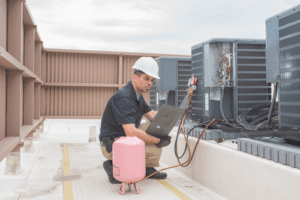When it comes to planning a commercial HVAC system, the goal is always to achieve effective heating, cooling, and ventilation for the entire building. What many people don’t realize, though, is that different types of HVAC systems can achieve this goal in different ways. Particularly, when you approach commercial HVAC companies about installing a new HVAC system at your building, you will typically get two different options: modular and integrated. This post will explain the specific characteristics that define each type of system, as well as the situations in which each system might be the ideal HVAC solution.
Integrated HVAC Systems
 Let’s start with integrated HVAC. When most people think of HVAC systems, they are picturing integrated systems. These systems are driven by one central unit that handles the heating and cooling needs for an entire building. Usually, in commercial settings, these units are mounted somewhere on the roof of the facility. From there, they deliver hot air, warm air, ventilation, and de-humidification to every section and room in your building.
Let’s start with integrated HVAC. When most people think of HVAC systems, they are picturing integrated systems. These systems are driven by one central unit that handles the heating and cooling needs for an entire building. Usually, in commercial settings, these units are mounted somewhere on the roof of the facility. From there, they deliver hot air, warm air, ventilation, and de-humidification to every section and room in your building.
Integrated systems can be configured to deliver differing levels of heating or cooling to separate parts of the building, by way of zone control technology. For the most part, though, these systems are centralized hubs that handle a building’s temperature control on a macro level. Think of an integrated HVAC system as the “heart” of your building, with ductwork acting as the veins and delivering the air throughout your facility.
Modular HVAC Systems
On the other hand, when you have a modular HVAC system, you essentially have multiple separate HVAC units that are operating as one. Where an integrated system relies on one central system to drive the heating and cooling for the entire building, a modular system is broken up into pieces that operate independently but are set up to achieve a common goal.
There are a few significant benefits to using a modular HVAC system. First of all, as the name implies, modular systems offer flexibility that integrated systems cannot. When you select an integrated HVAC system for your building, you need to make sure that it can meet the needs of the whole building. If the unit isn’t powerful enough, it isn’t going to be able to cool or heat the entire space effectively. If the unit is too powerful, it will waste energy and result in inconsistent patches of hot air, cold air, and humidity throughout your building. You need to calculate everything precisely to make sure the power of your unit is just right.
These types of calculations are possible, and hiring the right commercial HVAC companies to help with your commercial HVAC system will take the onus of choosing an appropriate HVAC system off your shoulders. Still, though, what a business requires from its HVAC system today may not be the same as what it needs five years from now. What if you renovate or build an entire addition onto your building? These kinds of extensions leave you with a challenge, because your integrated HVAC system may no longer be powerful enough to handle the heating and cooling needs of the entire building. You’re left with a dilemma of whether to replace the whole system—an expensive, burdensome proposition—or find a workaround.
Modular systems don’t have the same limitations. As your business and building grow, it’s easy to implement new HVAC modules to keep pace with those shifts. There are other benefits to modular systems, too. For instance, with an integrated HVAC system, if the unit fails, your entire building is without heating or air conditioning until you can get the unit repaired. If a unit in a modular system fails, that’s just one part of your facility that must go without HVAC. Residentially, modular systems are becoming popular in the construction of modular buildings.
Working with Commercial HVAC Companies to Choose the Right System for Your Building
While there are distinct advantages to having a modular system, there are also big upsides to the more traditional integrated approach. Integrated systems are typically more energy-efficient, as you only have one unit pulling energy to produce and distribute hot or cold air. In a modular system, you have multiple systems performing this operation at the same time, and while those systems are smaller, they still tend to use up more energy collectively.
Integrated systems will also usually have lower lifecycle costs than modular systems. Instead of regularly servicing, maintaining, and repairing individual components of your system, you can invest in servicing your central unit regularly. The simplicity of managing this kind of arrangement also appeals to many business owners.
Ultimately, which choice is ideal will depend on your business and your building. Do you expect to expand or renovate your building extensively at some point in the next few years? Alternatively, is your building built in a segmented fashion that might preclude a centralized system? If so, then a modular HVAC setup might be right for you. Otherwise, an integrated system probably makes sense. Consult with qualified commercial HVAC companies for help with your decision.

